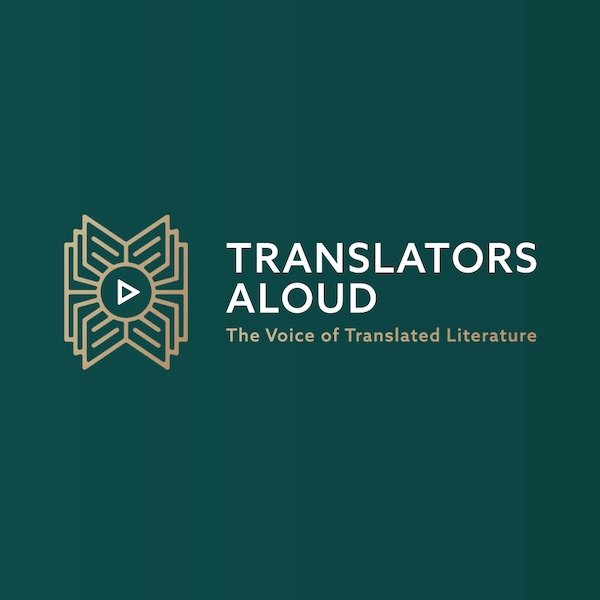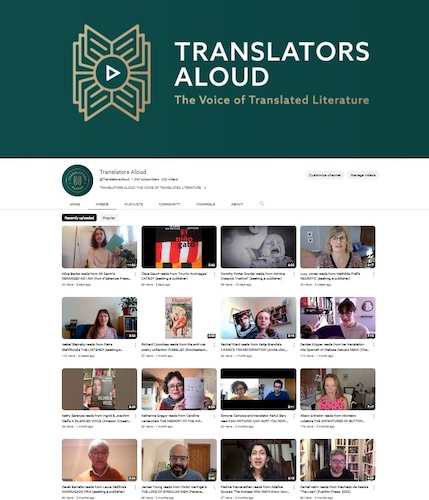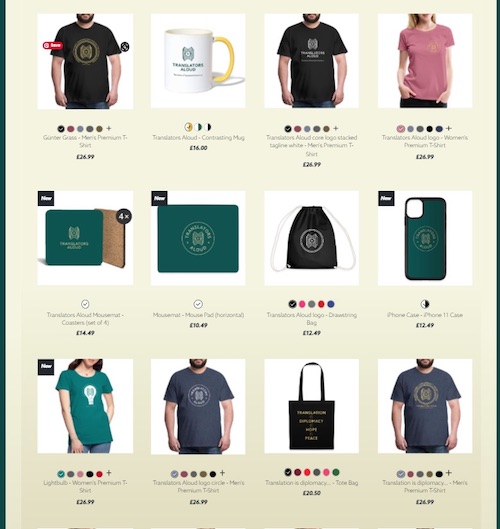Translators Aloud: Charlotte Coombe and Tina Kover
by Ros SchwartzIn May 2020, in the early months of the first Covid-19 lockdown, Tina Kover posted on Twitter that she was considering uploading a video of herself reading from one of her translations but wasn’t sure if anyone would be interested in watching such a thing. Amid a flurry of replies, fellow translator Charlie Coombe suggested they create just such a platform together – and by the end of the day, the YouTube channel that became Translators Aloud was born. Devoted to sharing the work of literary translators, both published and unpublished, read by the translators themselves, the channel has gained around 2,000 YouTube subscribers and 3,500 Twitter followers, and to date has shared over 450 videos by around 300 translators working from or into 45 languages. Here is their story so far…
—
Ros: Why do you think there was a need for such a platform?
Charlie: We realised there was nothing like this out there – a place where translators could share readings from their work to promote their translations, their authors, and themselves – and it surprised us! We wanted to create a space for sharing great literature from all over the world, and for highlighting the people who make it happen: translators.
Tina: Also, we think that part of the reason for many publishers’ ‘othering’ of translation, or perception of it as less worthy somehow, and of literary translators less as creative artists than writers, is that we don’t have much of a visible presence on the literary scene. This is getting better in terms of public events, translator interviews and translators being credited on book covers, but there’s still a lot of work to be done. So we wanted to create a space where translators could literally be seen and heard – aloud! Their passion for the work comes through loud and clear in these videos, and it’s a vital tool in helping readers and publishers connect with translators and translated literature, and tune in to the passion and excitement we as translators feel for our craft and for the books we translate.
How does the platform work?
Charlie: We mainly focus on translations into English from other languages, but we accept bilingual readings too – we have featured quite a few author and translator readings, with both the source text and the translation being read. The way it works is: translators send us their readings along with a synopsis, relevant links and bios, and we share them on YouTube, then promote them on our Twitter account. We have specific themed playlists for Women in Translation, publishers, Poetry, Kids’ Lit and so on, which helps YouTube viewers find relevant content. We also have a very popular ‘seeking a publisher’ playlist for translators who have done samples of books not yet published in English.
How do you recruit translators to read their work?
Charlie: We are open for submissions all year round, much like a literary journal might be. We regularly do specific submissions callouts on our social media for certain special features such as Women in Translation month, World Kid Lit month and so on, but anyone can send in a submission at any time to our email translatorsaloud@gmail.com, or get in touch via social media. We also collaborate with translator groups and various publishers who encourage their translators to submit.
We really feel like we’ve created something unique and important here, and now we’re looking to shout about it from the rooftops.”
What has been the impact of the platform and has it surprised you?
Tina: We’ve been staggered by the warmth of the reception, frankly, and by translators’ eagerness to contribute readings. Also we have begun collaborating with multiple publishers who have approached us with the aim of making these readings part of their publicity efforts for translated books, which is exactly what we hoped for. We’ve been interviewed by organisations like the European Literature Network and discussed in academic textbooks as part of the global effort to increase translator visibility. We really feel like we’ve created something unique and important here, and now we’re looking to shout about it from the rooftops.
Charlie: Yes, I have to say I am really proud of how Translators Aloud has become part of the literary translation landscape in such a short time. We had hoped it would become a go-to for translators when thinking about how to promote, share or pitch their work, and that is becoming a reality now. Our next goal is to make it more widely known to readers, agents and publishers looking for new literature from around the world.
What is the value of Translators Aloud to publishers? How would you encourage them to visit the site?
Tina: Interviews such this one are an invaluable part of making publishers aware of our channel, and we hope that once they visit, they’ll be regular viewers of our new releases. We believe Translators Aloud can be of value to publishers in many ways. First of all, it can be a valuable part of the pitching process. Obviously publishers don’t have time to read all the books that might be a good fit for their list, especially when those books are not in English. So this is a perfect way to get a ‘taster’ of a book and see if it’s something they might be interested in – read by a translator who is already passionate about the project and has already begun the work of translating it. We have the dedicated ‘seeking a publisher’ playlist on the channel, and we also sort the videos by type of book (memoir, non-fiction, crime fiction, romantic fiction, sci-fi, etc.), so if a publisher is looking for something specific in terms of theme, it’s easy to find. There are also dedicated playlists for translations from each language, so if a publisher wants to focus on translations from a particular language, they know exactly where to find them. We encourage our contributing translators to include the link to their ‘seeking a publisher’ reading as part of a pitch; it’s an easy way of sharing a sample in just a few minutes, and also lets the publisher see the translator ‘face to face’ (we all know how important that is, and how much more effective than just words on a page), and get a true feel for how enthusiastic they are about the book they’re pitching.
Charlie: Translators Aloud really can act as a useful promotional tool for books put out by either smaller indie presses or bigger publishers. We hope that as time goes on, publishers will increasingly recognise this and will be the ones suggesting to their translators that they do readings for us (rather than the other way round). We also hope that publishers’ promotional and social media teams will get more involved in sharing these videos with their readers – it’s such a nice way to highlight the translator’s role in the publishing process, and to offer a teaser of the book in question, to spark readers’ interest and to boost sales. We plan to contact more publishers directly to let them know about the work we are doing, but we are currently running the project unfunded, so we are looking into how to obtain funding to help us develop the scope.
And for booksellers and librarians?
Tina: By linking to our channel and our website, and offering leaflets at their physical locations, booksellers and librarians can help customers find their next read with quick ‘taster’ excerpts of books, stir up excitement about new and recent releases of translated fiction, promote translator appearances, and, as we’ve said, make translated literature – world literature – feel less ‘other’. The excitement of the translators themselves about these books is contagious, we’ve found! Hearing someone read a beautiful excerpt of a book they love makes others want to read that book too.
Our little lockdown project has evolved in ways we could never have imagined. I feel more part of the literary translation community than ever before.”
What are your plans for future funding?
Charlie: We have been doing this on an entirely voluntary basis so far – although we have also sold some merchandise and received some donations. Most of this money was used to fund a bursary for the British Centre for Literary Translation Summer School at UEA, and a little was fed back into promoting the channel itself.
Tina: The Translators Aloud bursary for the BCLT Summer School is one of our proudest accomplishments so far; we were able to fund full virtual participation in July 2022 for a translator identifying as non-white, and the bursary was awarded to a Canadian literary translator from Burmese who also works for Doctors Without Borders. In 2023, we are funding a travel bursary. We hope to make the TA bursary a regular annual award and even to fund more than one translator, and for full, in-person, residential participation (which is of course more expensive than virtual participation), and becoming better known is a key part of that. We’re hoping that with more widespread exposure we’ll gain more donations and also sell more merchandise.
What have you gained personally from the project?
Tina: Not only have I got to meet and come to know so many of the incredibly talented translators that contribute to our channel, but I have gained a whole new appreciation for the amazing world literature being published these days and have discovered a whole new variety of books to add to my own to-be-read pile that I wouldn’t have known about otherwise. It feels great to know that we have filled a gap in the industry by creating something that didn’t exist before, and for which there was obviously such an appetite among translators and publishers. And of course, in Charlie I have gained a dear friend and kindred spirit.
Charlie: Same here! Creating and running Translators Aloud for almost three years with Tina has been such a fun and interesting challenge and I have gained an amazing friend out of it. Our little lockdown project has evolved in ways we could never have imagined. I feel more part of the literary translation community than ever before. Being connected virtually is an important part of networking in this post-pandemic world. It’s a joy to be constantly discovering new work by all these different translators from all over the world, and to be supporting and supported by these translators.
Do you have any success stories, i.e. a translator who read their work on Translators Aloud and subsequently found a publisher?
Charlie: Absolutely! We recently conducted a survey among translators who had submitted readings to our ‘seeking a publisher’ playlist, asking if the translation they’d read from has since been picked up by a publishing house, and it’s resulted in lots of new collaborations. We’re confident that there’s a great deal more success to come in our efforts to help translated books find homes with English-language publishers. The key will be broadening our exposure and making more and more authors, agents, scouts and editors in the publishing industry aware of us. It’s our aim to be thought of as a go-to resource for samples of the world’s best books that are as yet unavailable in English, curated and presented by the very talented artists dedicated to translating them.
Tina: We’re thrilled, of course, that the channel has been welcomed so warmly by translators and publishers, and by people who were already lovers of great world literature. But our broader and more long-term hope is to be seen as less ‘niche’ – that is, to be the go-to channel for anyone (readers, book bloggers, book clubs, reviewers) looking for their next read, not just translation aficionados, and to be a resource for all publishers looking for their next bestseller, not just the ones that specialise in foreign literature. In short, we’re not about ‘good translated books’, we’re about good books, period, and we want the whole world to know it! All we need is more exposure, and we’re doing everything we can to get that.
—
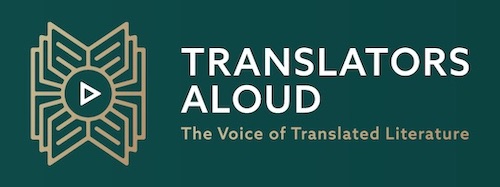
Read, watch and connect:
translatorsaloud.com
YouTube: TranslatorsAloud
Twitter: @LoudTranslators
Instagram: translatorsaloud
Facebook: TranslatorsAloudFB
Submissions: translatorsaloud@gmail.com
Donate: ko-fi.com/translatorsaloud
Shop: translatorsaloud.com/shop/#!/
—
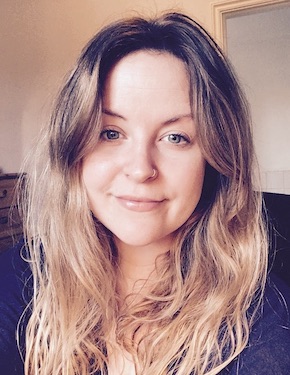
Charlotte Coombe is a literary and creative translator from French and Spanish into English, and has translated authors including Marvel Moreno, Margarita García Robayo, Antonio Díaz Oliva, Juan Villoro, Jimena González, Eduardo Berti, Abnousse Shalmani, Ricardo Romero and Vincent Doumeizel. Her work has received the Oran Robert Perry Burke Award for Literary Translation, two PEN Translates awards, and has been shortlisted for the Premio Valle Inclán. She also offers mentoring to emerging literary translators.
cmctranslations.com
@CMCTranslations
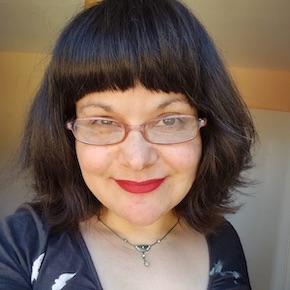
Tina Kover has translated more than thirty works of modern and classic fiction, non-fiction, and biography, including novels by George Sand, Alexandre Dumas, Négar Djavadi, Emmelie Prophète, Alexandra Lapierre, Mahir Guven, Marc Lévy and Anne Berest. Her work has won the Albertine Prize and the Lambda Literary Award and has been shortlisted for the US National Book Award, Oxford-Weidenfeld Translation Prize, Scott Moncrieff Prize, Dublin International Literary Award, PEN Translation Prize, and the Warwick Prize for Women in Translation. She also leads literary translation workshops for the American Literary Translators Association and gives masterclasses in literary translation at Durham University.
@tinakover
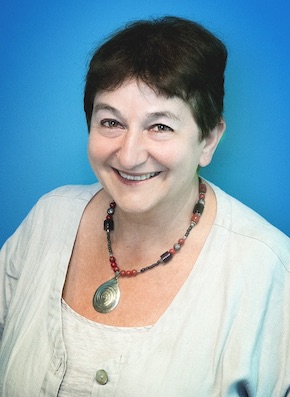
Ros Schwartz is an award-winning translator from French, acclaimed for her new version of Antoine de Saint-Exupéry’s The Little Prince (2010), as well as works by authors including Georges Simenon, Tahar ben Jelloun, Fatou Diome, Ousmane Sembène and Max Lobe. She was made a Chevalier de l’Ordre des Arts et des Lettres in 2009, and in 2017 was awarded the John Sykes Memorial Prize for excellence by the Institute of Translation and Interpreting. A Royal Literary Fund Advisory Fellow, she is energetically involved in translator training, gives masterclasses worldwide, and is co-director of the Bristol Translates summer school at the University of Bristol.
rosschwartz.co.uk
@RosSchwartz

